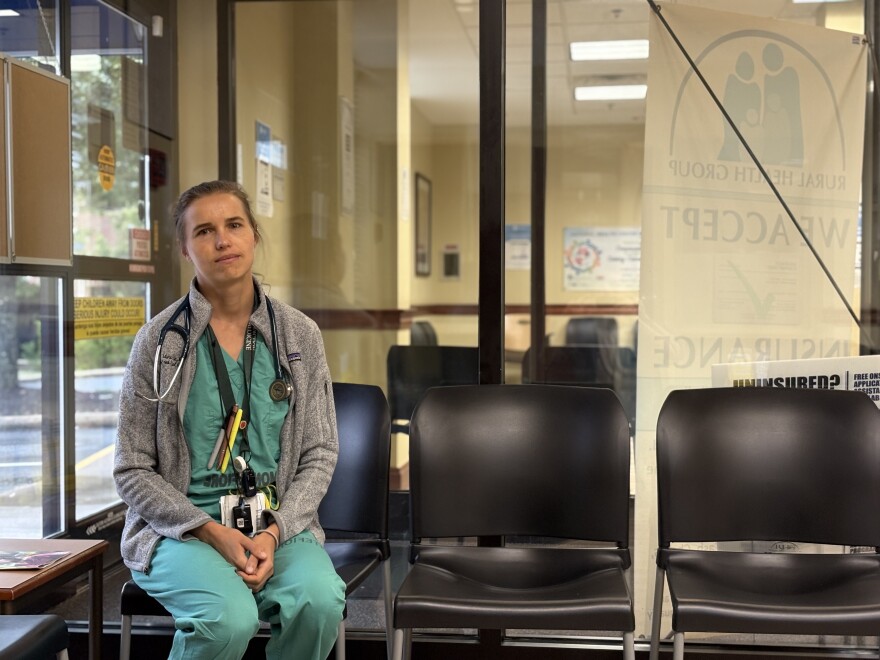Congress has cut federal funding for public media — an $800,000 loss for WFAE. We count on readers like you to protect our nonprofit newsroom. Become a monthly member and sustain local journalism.
North Carolina lawmakers return to Raleigh this week to continue hammering out the state budget, and one of the biggest questions hanging over them is the future of Medicaid expansion.
Nearly 680,000 North Carolinians have gained coverage since the program launched in 2023. But President Trump’s “One Big Beautiful Bill,” the sweeping tax and spending package signed into law earlier this summer, could put that coverage and the survival of some rural hospitals at risk.
Helping in Henderson
At the end of the workday at a Rural Health Group clinic in Henderson, north of Raleigh, staff grab their backpacks and lunchboxes as a receptionist locks the door.
Dr. Laura Ucik, in bright green scrubs, reviews her patient notes.
“Tons of diabetes today,” she says. “Some acute stuff.”
She also saw migrant workers and a patient with substance use disorder — typical cases in this town of about 15,000 people just south of the Virginia line.
Over the past two years, Ucik says more and more of her patients have gained coverage through North Carolina’s Medicaid expansion. For her, it’s been transformative.
“They get Medicaid, and we’re like, ‘Let’s go!’” she says with a clap. “They’re the best visits.”
Before expansion, many patients skipped care they couldn’t afford. Now, she says, she can order tests and know they’ll get done. Patients can see specialists, afford insulin, get transportation to and from appointments and access life-saving medication.
But her enthusiasm has turned to worry since the Republican-backed tax and spending bill became law.
Her top concern: young patients with Type 1 diabetes.
“If they lose Medicaid,” Ucik says with an exhale, “life is over. Like, it’s just over. They’re not going to make it to 30. There’s no way.”

A lifeline for rural hospitals
Since Medicaid expansion began in 2023, more than a third of the nearly 680,000 new enrollees have come from rural counties. That has brought new revenue to struggling hospitals.
“The increased revenue from larger Medicaid populations has helped improve their financial performance, and in some cases actually reduced the risk of closure,” says Debra Farrington, North Carolina’s deputy secretary of health.
But when lawmakers approved expansion, they added a catch. If the federal government stops covering 90% of its cost, Medicaid expansion ends immediately.
That "trigger clause" was a primary reason why North Carolina Sen. Thom Tillis broke with his party and voted against the tax and spending bill in June.
"What do I tell 663,000 people in two years or three years," he asked on the Senate floor, "when President Trump breaks his promise by pushing them off Medicaid because the funding is not there anymore?"
Not only would thousands lose coverage, but the fallout could ripple through the state’s entire economy.
“Rural hospitals are often the largest employers in these tiny towns as well,” says Dr. Joel Gallagher, an allergist in Reidsville. “So keeping them open really allows a whole community to thrive.”
Even patients who don't lose coverage could be affected. Gallagher points to Annie Penn Hospital, owned by Cone Health. The hospital closed its labor and delivery unit in 2008 amid staffing shortages. If more services are cut, he says, the entire community would feel it.
“Instead of a five-minute ambulance ride, it would be a 40-minute ride to Greensboro,” he says.

A new federal fund, but not enough
Republicans in Congress anticipated that risk. The "One Big Beautiful Bill" includes a $50 billion rural hospital fund. North Carolina’s share could be around $100 million a year.
But state officials say that won’t offset the $3.7 billion the state’s rural hospitals are projected to lose.
“We’re very much in a wait-and-see,” says Tim Evans, CEO of Mountain Community Health Partnership in Mitchell and Yancey Counties. “You know, what’s actually gonna happen? No idea.”
His clinics serve areas that are still reeling from Hurricane Helene, and he says he doesn’t envy state lawmakers, who must now decide whether to remove the "trigger clause" and keep expansion alive with state dollars — even as the budget is stretched thin by disaster recovery and the expansion of private school vouchers — or let the program end.
“I feel real sympathy for them trying to figure out how to run the state, given that they don’t have any idea what’s coming tomorrow from Washington,” Evans says.
He’s most worried about the nearby Blue Ridge Regional Hospital in Spruce Pine — one of five hospitals Governor Josh Stein has warned could be at risk of closing under the new law.
The hospital declined an interview, but said in a statement that “financial headwinds” remain a “serious issue.”
For Evans, it feels like another storm on the horizon.
“We didn’t know that the storm would be coming from Washington as much as from Helene,” he says.
And for patients and providers across North Carolina, the forecast remains uncertain.
SUPPORT LOCAL NEWS
No matter what happens in Congress, WFAE remains committed to our mission: to serve our community with fact-based, nonpartisan journalism. But our ability to do that depends on the strength of the financial response from the communities we serve. Please support our journalism by contributing today.



